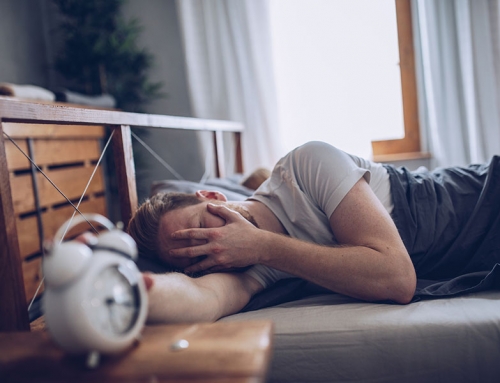It doesn’t matter how long you’ve used one for, an alarm never ceases to be jarring—waking you with a jolt and setting you up for a stressful day. Wouldn’t it be nice to develop the ability to wake up naturally, slowly coming around to the morning in a manner that works for your body? Here are five tips to get you on the path to an alarm-free lifestyle!
1. Go to bed at the same night each night
Table of Contents
The simplest and most foolproof way to wake up without an alarm is to go to bed at the same time, each night. It might sound like a tip lacking strategy or science, but your internal body clock is an accurate and consistent tool that loves a regular schedule.
The key here is creating a consistent period of rapid-eye-movement (REM) sleep. This is the deepest and the most rejuvenating part of the sleep cycle, and predictable REM stages will do the most to create overall predictability in your nighttime routine. To learn how important REM sleep is and how to get more of it, check out our article here.
REM is one of five stages in the sleep cycle, and a typical night’s sleep contains four or five whole cycles. By gauging the natural length of your sleep cycle (which should be about 90 minutes, according to Psychology Today) it’s possible to calculate when you should be going to bed—counting back from your ideal wake up time to find the right bedtime. There are free apps to help you with this, including one built into Apple products.
Daniel Barone, neurologist at the Cornell Medicine Center for Sleep Medicine, told Refinery 27 that some people may already be subconsciously adopting this approach. Those who you usually wake up a few minutes before their alarm are already scheduling their bedtime to coincide with sleep cycles, meaning they may be able to get rid of their alarm altogether.
2. Trade-in your alarm clock for a dawn simulator
Dawn simulators have increased in popularity as a subtler and more gentle version of an alarm clock. They operate by slowly filling your bedroom with light, mimicking a sunrise, thereby signaling to your circadian rhythm that it’s time to begin the wake-up process. So the theory goes, a more gradual awakening = a less sluggish and stressful morning.
While studies proving this theory are thin on the ground, The Guardian cites a few papers finding self-reported improvements in how alert and awake participants felt while using dawn simulators. Dutch researchers made a comparison study between dawn lights and a control group awoken by an alarm and a regular light being switched on, and found that dawn simulators supported a faster reduction of sleepiness.
3. Make sure your sleep is good quality sleep
Faithfully adhering to all the steps on the list will only help you in your quest for a natural wake up if the sleep you do get is genuinely restorative. Waking up on your own terms is most likely to happen if you can achieve 7-9 hours of real and restful sleep (but you already knew that).
The biggest determiner of sleep quality is your mattress. An unsupportive, hot, and movement-amplifying sleep surface can disrupt even the soundest sleepers. On the other hand, a mattress that uses memory foam, latex, or pocket coils to help align your head, hips, and spine will give you every chance of an alarm-less wakeup.
For more information on how to select a mattress that suits your needs and preferences, refer to our guide to choosing the best mattress.
4. Set positive intentions and cut down on anxiety (if possible)
Just as an unsupportive mattress can negate any progress to an alarm-free lifestyle, the daily stresses that can seep into the nighttime hours also disrupt sleep, negating any chance of a natural wake up.
This might mean work or family worries, but the idea of not setting an alarm can itself be anxiety-inducing. If you’re going to be worrying that not setting an alarm will result in a morning of missed appointments, you may well find yourself lying awake until the early hours, reminding yourself what time you need to get up.
In the same way, aiming for the perfect, optimized morning routine can bring its own pressures that reduce your ability to happily wake up without an alarm. As this Quartz article explores, aiming to pack in an exercise regiment, healthy breakfast, meditation, journaling and any number of other popular mindful preparations for the day, can turn what should be an hour or so of relaxation into a hectic routine, to which your body may well say a firm ‘no.’
5. Develop a bedtime ritual
You’ll have no doubt heard this tip before: stop work a few hours before bed, take some time to relax, perhaps read or listen to a book. It’s such a common piece of advice that calls to turn off your devices and give yourself a quiet period before bed can begin to sound patronizing. But the truth is that good sleep does require a transitional period between the active part of your day and when your head hits the pillow.
The reason for this is your circadian rhythm—the body’s internal sleep/wake cycle that helps stimulate feelings of sleepiness and alertness through a release of hormones like melatonin. Your circadian rhythm is informed by your body clock, which itself responds to levels of light and stimulation in the environment, meaning that a hectic evening can disrupt its functioning.
Along the same lines, ensuring you’re out in the fresh air early, in the morning, helps keep melatonin levels in sync. As SleepAdvisor suggests, going outside will do more than expose you to the sleep-regulating effects on the sun. It can also oxygenate your blood, rejuvenate your energy levels, and simply help your feel fresh and ready to take on whatever the day has in store.





